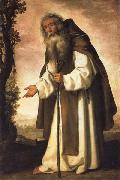
Oil On
Canvas, Real Flavor of Old Masters
|
Francisco de Zurbaran
|
|||
|
|
|||
| 1598-1664 Spanish Francisco de Zurbaran Galleries Spanish baroque painter, active mainly at Llerena, Madrid, and Seville. He worked mostly for ecclesiastical patrons. His early paintings, including Crucifixion (1627; Art Inst., Chicago), St. Michael (Metropolitan Mus.), and St. Francis (City Art Museum, St. Louis), often suggest the austere simplicity of wooden sculpture. The figures, placed close to the picture surface, are strongly modeled in dramatic light against dark backgrounds, indicating the influence of Caravaggio. They were clearly painted as altarpieces or devotional objects. In the 1630s the realistic style seen in his famous Apotheosis of St. Thomas Aquinas (1631; Seville) yields to a more mystical expression in works such as the Adoration of the Shepherds (1638; Grenoble); in this decade he was influenced by Ribera figural types and rapid brushwork. While in Seville, Zurbur??n was clearly influenced by Velazquez. After c.1640 the simple power of Zurbaran work lessened as Murillo influence on his painting increased (e.g., Virgin and Child with St. John, Fine Arts Gall., San Diego, Calif.). There are works by Zurbar??n in the Hispanic Society of America, New York City; the National Gallery, Washington, D.C.; and the Philadelphia Museum of Art.. | |||
|
|
|||
|
|
St.Anthony Abbot new3/Francisco de Zurbaran-323822.jpg Painting ID:: 28903 Visit European Gallery |
mk65 Oil on canvas 63 3/4x47 1/4in | |
Height Width |
INS/CM |
||
|
X |
|
||
|
|
|||







